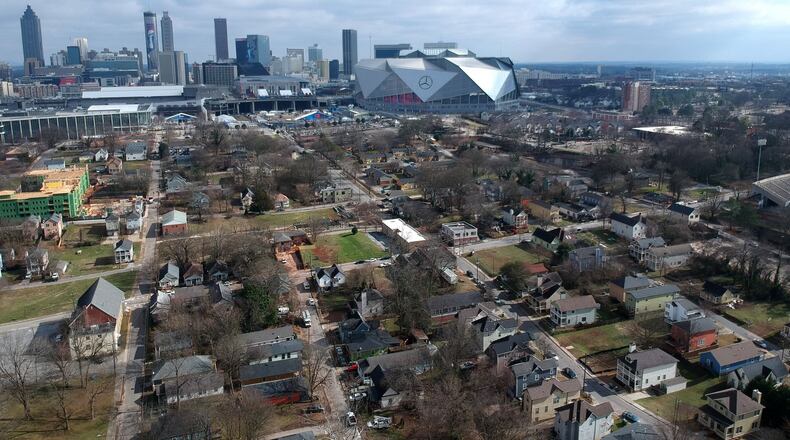All during 2021, there was a struggle going on for the soul of Atlanta, and it wasn’t in the city elections.
With all due pride in everything we love about our city, the soul of Atlanta lies in its residential neighborhoods. It is above all in their homes that our citizens of all races and all backgrounds live, love and dream, nurture families, put down roots and engage in community life.
Starting with Mayor Maynard Jackson’s administration, the city has sponsored a structure of Neighborhood Planning Units (NPUs) to protect neighborhoods by giving them the first say in the rezoning and development process. Overall, it has slowed, focused, and in some cases stopped developers; and made them work harder to adapt their projects to the benefit of the neighborhoods surrounding them.
Credit: contributed
Credit: contributed
Last year, though, the city administration tried to blow this protection for neighborhoods to kingdom come. Led by then-Mayor Keisha Lance Bottoms and then-Planning Commissioner Tim Keane, later joined by City Councilman Amir Farokhi, the city government itself attempted to do what the NPU system for half a century has largely kept developers from doing: force high-density development into neighborhoods that don’t want it.
Farokhi proposed to rezone, in one fell swoop, over 2,000 residential parcels from single-family to multi-family, all over the city. Bottoms’ and Keane’s proposal was more subtle, and more dangerous: to give, to anyone who owns a parcel which is zoned single-family residential, blanket permission to ignore the zoning provisions for lot size, number of residences, parking, set-back lines, and so on – in short, to “end single family zoning,” as the Atlanta City Design Housing plan explicitly said.
These destructive changes were allegedly necessary to create more affordable housing, which everyone agrees the city needs. They were justified by the nonsensical argument that Atlanta, which has hovered at or under 500,000 people for 50 years, would somehow grow to 1.2 million “in the next few decades.” And they were accompanied by the demonstrably false argument that NPUs never agree to higher density in their neighborhoods.
The proposals were ultimately defeated because homeowners saw through the claims, and rose up. Leaders of 19 NPU’s, from Buckhead to Midtown to Southwest Atlanta, led by Gloria Cheatham of NPU-A, joined in meetings, phone calls, and letters, asking the city not to rezone en masse. They had to fight through low public awareness (since the proponents would have been perfectly happy to rush the changes through without adequate citizen debate) and flat-out disinformation from the Planning Department, but ultimately the city government backed off.
Indeed, none of the “justifications” put forth by last year’s city administration hold up under scrutiny, in particular the one about affordable housing. There are over 11,000 acres of vacant residential land in the city, of which almost 4,000 are publicly owned. All of this is available for affordable housing, and the new Dickens administration is following just this strategy, starting with the Beltline and Westside. The new mayor himself wrote me on May 2 of last year, saying “I don’t support a ban on single family zoning in the city. We have a lot of vacant lots and burned-out/abandoned homes that we can develop/redevelop on and try to have balanced growth in the city.” This is a sensible plan for affordable housing. Homeowners all over the city hope he doesn’t change his mind.
In truth, this whole battle has been, and is, between urban planning theoreticians and homeowners. The theoreticians, now as always, want more density. Homeowners want to be able to choose. If they want high-density neighborhoods, Atlanta offers those; if they want low-density neighborhoods, Atlanta has those too, and should protect them.
Now the legislature has weighed in on the side of the neighborhoods. HB 1405, passed this year, and as of this writing awaiting the governor’s signature, contains language to ensure that the city (any city, not just Atlanta) will have to make neighborhoods aware if it tries to destroy zoning protections as Atlanta did last year. Among other things, the city will have to post signs on every affected premise, or if there are more than 500 parcels affected, every 500 feet in the affected area. This language was developed by two former Atlanta state representatives – Beth Beskin and myself – and sponsored and ably shepherded principally by State Rep. Chuck Martin, R-Alpharetta.
So far, then, the neighborhoods have prevailed against the theoreticians. This is good news. The soul of Atlanta, for now, seems to be safe.
Atlanta native Bob Irvin is a former Republican minority leader of the Georgia House of Representatives and a former chairman of Georgia Common Cause.
About the Author
Keep Reading
The Latest
Featured


